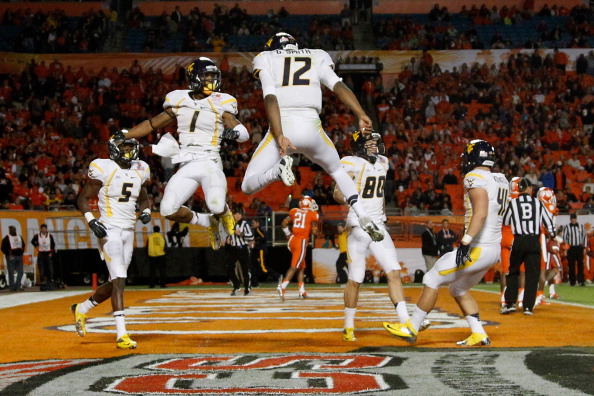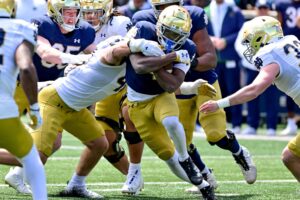Fall camp gets underway in a matter of days. The West Virginia football team finds itself just five weeks shy of the season-opening Backyard Brawl. As the news cycle shifts soon to pre-season camp battles, we look to round out our series on Mountaineer Moments in Adversity series. After taking a look at everything from WVU’s first ranked win to its gutsy 1993 win over Miami, we now focus on the 2011 season. For the sixth of our 10 Mountaineer moments in adversity, we flash back to West Virginia’s 70-33 Orange Bowl win over Clemson.
Mountaineer Moments in Adversity Part Six
Pre-Season Drama
After former Head Coach Rich Rodriguez‘ abrupt departure for Michigan following three straight 11-win seasons, Mountaineer fans found themselves frustrated after three straight nine-win seasons under Head Coach Bill Stewart. Fans loved Stewart plenty. That said, he found difficulty retaining his high-caliber recruits, and the offense looked pedestrian during his tenure. Indeed, the Mountaineers finished 73rd, 68th, and 78th in scoring offense during those three years. And that came against a fledgling Big East conference that would cease to exist as a football league in the immediate future.
Indeed, West Virginia played its final Big East football in the 2011 season. Before the season, Athletic Director Oliver Luck hired Dana Holgorsen to act as offensive coordinator for one season. Holgorsen would then replace Stewart in the 2014 season. Perhaps the “head-coach-in-waiting” concept was doomed to fail from its moment of conception. That said, the normally-affable Stewart allegedly leaked unflattering information about Holgorsen to the Pittsburgh Post-Gazette. This led to Stewart’s forced resignation, and Holgorsen took over the Mountaineers as head coach a year earlier than anticipated. Thus, the Mountaineers’ final Big East season started with adversity.
Up-and-Down Season
Holgorsen definitely reinvigorated the fanbase with his high-octane “Air Raid” offense. WVU finished the season 13th in the nation in scoring offense, a vast improvement from the prior three seasons. That said, wins did not come as easily as anticipated. In 2010, the Mountaineers finished with the fourth-best defense. In 2011, that unit fell all the way down to 62nd. The unit definitely struggled against a limping Big East that finished with just one other ranked team (Cincinnati at 25th).
The Mountaineers started the season with three straight wins, but they fell 47-21 to LSU in game four. After that loss, the Mountaineers climbed as high as 11th in the nation before a crippling 49-23 loss to a Syracuse team that finished just 5-7. Two games later, the Mountaineers, barely clinging to a top-25 spot, lost to Louisville. After that game, West Virginia found itself unranked at 6-3.
West Virginia responded, however, by taking down Cincinnati, Pitt, and South Florida to finish 9-3. This set up a three-way tie atop the Big East, and the Mountaineers won the tie-breaker to earn an invitation to their final BCS Bowl (the Orange Bowl) to face the Clemson Tigers.
Heavy Underdogs Surprise the Nation
To say the Mountaineers entered the Orange Bowl as heavy underdogs is a bit of an understatement. Universally-acclaimed Head Coach Dabo Swinney had the Tigers rolling in his fourth season leading the Tigers. Clemson’s offense was led by several future NFL stars and a former WVU commit as a signal caller in Tajh Boyd. Andre Ellington, Deandre Hopkins, Sammy Watkins, Dwayne Allen, and Martavis Bryant all found NFL homes. Thus, Clemson entered the Orange Bowl with what expert viewed as the vastly superior offense.
The Mountaineers kept the game close through the first quarter, yielding just a 17-14 deficit at the end of the first quarter. Geno Smith hit Tavon Austin for a touchdown early into the second to capture the lead. On the next drive, however, Clemson marched down the field without difficulty. Then, Boyd handed off the Ellington who ran up the middle. In one of the more unforgettable scenes in West Virginia history, while Clemson celebrated what appeared to be a sure touchdown to take a 24-21 lead, safety Darwin Cook escaped from the back of the pile with the ball and scampered 99 yards for a touchdown. Just like that, West Virginia took a 28-17 lead.
The shovel-pass jet-sweep from Smith to Austin kept Clemson off-guard, and the Mountaineers scored 35 points in that second quarter on their way to a dominant 70-33 win. The 2011 season itself definitely represents another of our Mountaineer moments in adversity. In their final BCS appearance, however, West Virginia came ready to play, seized momentum, and never looked back.






